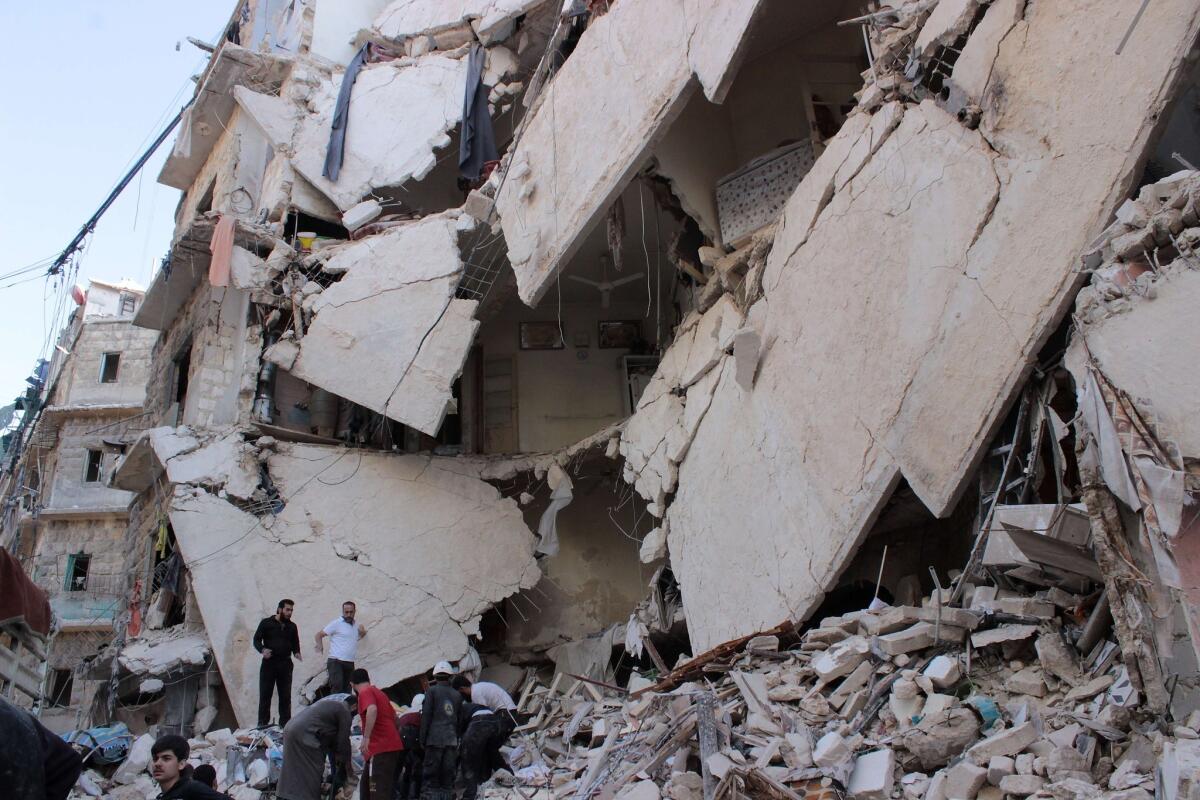Syrian regime releases hundreds of prisoners

- Share via
reporting from AMMAN, Jordan — The Syrian government released hundreds of prisoners as part of a general amnesty granted by President Bashar Assad in celebration of his reelection this week, according to opposition and government sources.
The Syrian state news agency SANA reported that 320 prisoners were released Thursday from Central Aleppo Prison “based on directives by President Bashar Assad.”
The prison, about five miles north of Aleppo near a vital supply route for fighters in rebel-controlled areas of Aleppo province, held 3,500 detainees and was the site of fierce battles between rebel factions and forces loyal to Assad. A yearlong siege of the prison by rebel fighters was broken late last month.
Activists in the Syrian Observatory for Human Rights, a pro-opposition watchdog based in Britain, confirmed the release.
“Most cases that were released from Aleppo Central Prison had tuberculosis. ... One released prisoner was taken to the hospital and died there,” said Ghayth Yaqout, an activist with the group.
The group also reported that 400 men and 80 women held on terrorism charges were to be released from Adra Prison, located in an industrial area nine miles northeast of the capital, Damascus, where sectarian massacres had taken place in December 2013. By Friday, more than 20 prisoners had reportedly been freed.
The Syrian government adopted a counter-terrorism law in July 2012 that defined terrorism as any act that “can destabilize public security” using “any method” -- allowing the government to detain tens of thousands of Syrians involved in the three-year uprising that has left over 160,000 dead and 9.5 million homeless, according to estimates.
The Violations Documentation Center, a Syrian monitoring group, estimated that there are 37,245 detainees held by both the government and the rebels across the country. It said they are often kept in horrific conditions and subjected to torture methods that include electrocution, burning, and sexual abuse.
Rami Abdul Rahman, director of the Syrian Observatory for Human Rights, said that lawyers for the detainees confirmed that the amnesty had come as a gesture by Assad after his landslide win in Tuesday’s presidential election against two virtually symbolic contenders. He garnered 88.7% of the vote in what was widely condemned as a “grotesque parody of democracy,” in the words of the British Foreign Office. Secretary of State John F. Kerry dismissed the election as “meaningless” and a “great big zero.”
However, Assad’s regional and international supporters hailed his win as the elusive political solution to the crisis and a clear indication of Syrians’ will.
“This is your zero. ... It wasn’t zero to the millions of Syrians who voted,” Hassan Nasrallah, general secretary of the Lebanese Shiite militant group Hezbollah, said Friday in a broadside attack on Kerry’s comments. In his speech, he also asserted that “any political solution in Syria starts and ends with the President Dr. Bashar Assad.”
Hezbollah’s forces have been key battlefield allies of the Syrian army, spearheading the urban combat tactics that the rebels had used with great success against Syrian army regulars ill-equipped for guerrilla warfare. The group’s efforts, along with those of other pro-Assad paramilitary factions, are credited for turning the tide of the civil war in the government’s favor.
Hezbollah’s involvement has also exacerbated the sectarian dimensions of the conflict, pitting Sunni fighters in extremist Islamist groups against Shiites and Alawites, members of the heterodox sect -- and religion of Assad -- that is an offshoot of Shiite Islam.
The increasing radicalization has been blamed for the West’s lackadaisical support for the rebels, leading to the rise of extremists in what Robert Ford, former U.S. ambassador to Syria and the Obama administration’s point man on the crisis, called an “ungoverned space that Assad can’t retake.”
Ford was referring to large swaths of northern and eastern Syria that have witnessed fighting between rival Islamist factions such as the splinter group known as the Islamic State in Iraq and Syria, the Al Qaeda-affiliated Nusra Front and nominally more moderate factions such as the Islamic Front and the secular Free Syrian Army.
“The moderates have been fighting constantly with arms tied behind their backs, because they don’t have the same resources that either Assad does or the Al Qaeda groups in Syria do,” Ford said in an interview on PBS’ “Newshour” last week.
More to Read
Sign up for Essential California
The most important California stories and recommendations in your inbox every morning.
You may occasionally receive promotional content from the Los Angeles Times.














